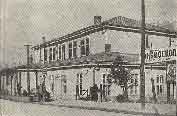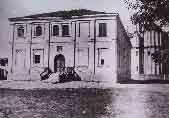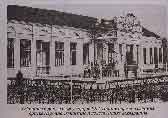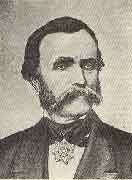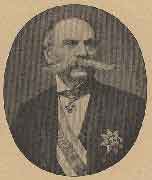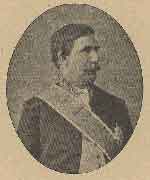National Assembly of the Republic of Serbia / National Assembly / History / History 1804 - 1918
History 1804 - 1918
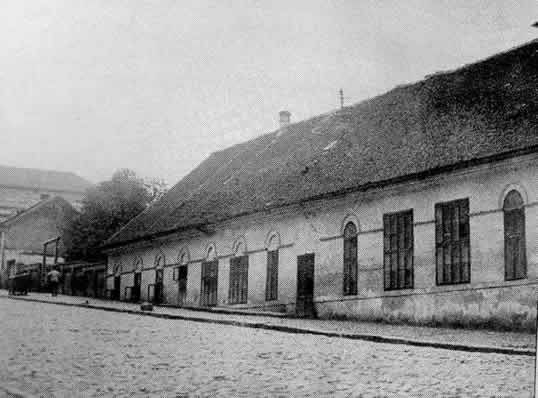
"The Great Beer Hall", where the St. Andrew's Day Assembly was held
1804 - 1918
The first Act on the National Assembly of Serbia was passed on October 28, 1858 . Based on this Act, the St. Andrew's Day Assembly was convened, and held from November 30, 1858 to January 31, 1859 in Belgrade. Thus the institution of National Assembly was made legal, and foundations were laid for a system of popular representation in Serbia.
Common-law assemblies were held from the beginning of the 19th century until 1858. They were convened either by the Prince or by the Council whenever they saw fit. They were also held during the First and Second Serbian Uprisings, from 1804 to 1815 ("Popular assemblies in times of uprisings"). The participants in these assemblies, except for a few rare cases, were invited by the Prince or by the Council, rather than elected by the people. Common-law assemblies were almost always held under the open sky, and thousands of people would attend. At one of them, the Sretenje Assembly, held on the day of the Serbian Orthodox Church religious holiday, the first Serbian constitution - Sretenje Constitution - was ratified. In early September of 1842, the "Defenders of the Constitution" headed by Toma Vucic-Perisic, aided by the Assembly, deposed Prince Mihailo and put Aleksandar Karadordevic in his place. Sixteen years later, at the St. Andrew's Day Assembly, they performed a dynastic coup and returned the Obrenovic family to the throne.
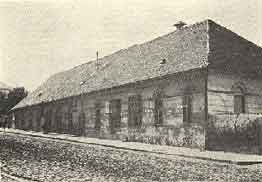
"The Great Beer Hall", where the St. Andrew's Day Assembly was held
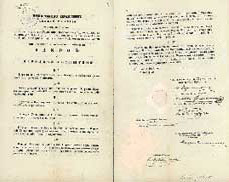
The Act on the National Assembly passed at the St. Andrew's Day Assembly
According to the Act on the National Assembly passed at the St. Andrew's Day Assembly, the Assembly was named "The Serbian National Assembly". It kept this name until it ceased to exist in 1918.
Serbian Constitutions (the 1835 " Sretenje" Constitution, the 1869 "Governors'" Constitution, the 1888 "Radical" Constitution, the 1901 "Octroyed" Constitution and the 1903 Constitution) provide for a National Assembly as an institution and regulate the question of its work. Unlike them, the 1838 "Turkish" Constitution does not even mention a National Assembly.
According to the Acts on the National Assembly passed by Prince Milos (1860) and Prince Mihailo (1861), the National Assembly was to meet every three years. According to the "Governors'" Constitution, a session of the assembly was to last for one year; according to the "Radical" Constitution, for three, and according to the "Octroyed" and the 1903 Constitutions, for four years. Sessions of the assembly could be regular and extraordinary.
The first set of Assembly Rules of Procedure was passed in 1870 as an Act. The first Act on the Election of Deputies was passed the same year.
The Assembly could be either ordinary or great. The great assembly was two or four times larger, according to the number of deputies, than the ordinary one. It was usually called when questions such as electing the Prince (or King) or changing the Constitution needed to be solved.
Voting in the Assembly could either be individual (by name), by deputies' sitting or standing, or by secret ballot. Voting by name was administered when final texts of Acts were considered, and whenever the Government or at least twenty Deputies demanded it. Assembly officials were elected by secret ballot.
The convening, opening, concluding, postponing, prolonging and dissolving of the Assembly were prerogatives of the Prince (or King).
Assembly sittings were opened by the Prince's (or King's) Speech, responded to by the Assembly with the Address.
Chairmen and Deputy Chairmen of the National Assembly were for a time elected by the Prince (or King) from among six candidates proposed by the Assembly; according to the 1888 and 1903 Constitutions, they were elected by the Assembly itself from among its members.
One Deputy was elected for a set number of taxpayers. Initially, one Deputy was elected for 500 taxpayers, then for 1000, then 2000, and finally for 4500 taxpayers. This electoral formula determined the number of Deputies in the Assembly. At the St. Andrew's Day Assembly there were 437, and later the number oscillated between 120 and 160. Great National Assemblies could number more than 600 Deputies.
Districts, counties and cities formed constituencies. According to the 1888 and the 1903 Constitutions, Belgrade elected 4 Deputies, Nis and Kragujevac 2 each, and other cities listed in the Constitution (21) one Deputy each. In counties, Deputies were elected according to the number of taxpayers.
Suffrage was held by every native or naturalised Serb over 21 years of age and paying tax on his estate, work or income. Women did not have suffrage.
Elections for deputies were organised by the Government.
Until 1888, public voting was practiced at elections for Deputies. The voter would publicly declare "whom he wanted for Deputy" at the polling station. The votes were noted and tallied.
Secret ballot was introduced in the 1888 Constitution. It was performed with little balls.
Voter turnout at elections oscillated between 50 and 70%. At the turn of the century, 550,000 citizens had the right to vote. In the elections held in May 1908, 397,750 voters, slightly more than 70%, turned out.
Apart from the Deputies elected by the people, the Assembly was also made up, according to the 1869 Constitution, of Deputies nominated by the Prince (or King). There was one nominated Deputy for every three elected ones. The 1888 and 1903 Constitutions provided for an Assembly comprised solely of elected Deputies.
Riots at elections were not infrequent. A tragic incident occurred at the polling station in the village of Goracici near Guca in February 1893, when the military intervened. Fifteen people died. As a result, a group of Deputies requested strict adherence to the Act on Ministerial Responsibility.
According to the 1869 Constitution, all members of the Council of State were appointed by the Prince. According to the 1888 and 1903 Constitutions, eight were appointed by the King, and eight elected by the National Assembly.
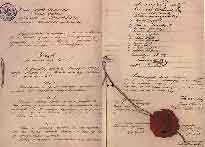
As for legislation, no law could be passed, repealed, modified or interpreted without the assent of the National Assembly. However, until 1888 the right of legislative initiative was held not by the Assembly but by the Prince (or King) and the Government. In other words, the Assembly was subservient to the Government, not the Government to the Assembly.
The Assembly was unicameral, except from 1901 to 1903. According to the Octroyed Constitution, the Popular Representative Body was made up of two chambers: the National Assembly and the Senate.
The first Assembly Committees were the Committees of Finance, Legislation, Education, the Army, the Economy and the Committee of Requests and Appeals.
The Assembly had the right of inquiry and investigation into elections and purely administrative matters.
The very first Acts on the National Assembly stipulated that no one could call a Deputy to account for what they said in the Assembly.
The first Acts on the National Assembly, and later the Constitutions as well, regulated Deputies' immunity from prosecution. Deputies could not be called to account, held in custody or imprisoned without the Assembly's authorisation. Even if they were caught in the act, the Assembly's opinion on whether they should be judicially prosecuted had to be heard.
Deputies' questions and proposals, interpellations, and citizens' requests and appeals to the Assembly are as old as the Assembly itself. For example, the Assembly sitting from 1897 to 1900 acted on 445 Deputies' proposals, 217 interpellations and more than 3000 citizens' requests and appeals.
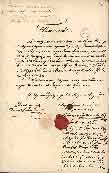
Deputy's Authorisation, August 11, 1859
A Deputy could not be under 30 years of age. One of the conditions for gaining the title of Deputy was to pay a certain amount to the State as immediate tax.
Members of the Senate had to be at least 40 years of age. Eighteen of them were elected, and 30 appointed by the King for life. The Crown Prince, on his coming of age, would also become a member; the Senate's number was completed by the Archbishop of Belgrade and the Bishop of Nis.
The first Deputies' Authorisations date from 1830. They were brought by Deputies elected by the people on the order of Prince Milos for the Great National Assembly in Kragujevac, where the Sultan's hatt-i sherif was read out.
The Deputies' Oath was taken by Deputies as early as the St. Andrew's Day Assembly. Its text, somewhat altered, was officially entered into the 1869 Constitution and all later Constitutions. Except for the word "Prince" being replaced by "King" in 1882, there were no other alterations.
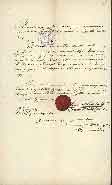
Deputies' Oath, August 15, 1864
The Deputies' daily wage (dijurna) was 15 grosa, or 15 dinars. The amount did not change during the Serbian National Assembly's existence.
At the openings and closings of Assembly sittings, or on other festive occasions, Deputies were obliged to wear identical people's formal suits of domestic manufacture.
Deputies wore a special badge in order to be distinguishable and to be able to use their rights.
The Assembly's Rules of Procedure were often broken. Disciplinary measures, such as denying a deputy the floor or removing them from the sitting were regularly entered into the minutes.
It was rare for Deputies' mandates to be taken away. The most interesting case occurred in 1882. It involved the removal from the Assembly of 45 Deputies, mostly Radicals. Since they again won the greatest number of votes at elections for the vacant seats, the Assembly decided that they could not be elected again, as they had once been removed from the Assembly. Their votes were annulled, and mandates were awarded to candidates with the greatest number of votes after the removed Deputies. Some of them became Deputies with only two votes. The opposition press named them "two-voters".
The first Government to be toppled in the National Assembly was the Government of Jovan Marinovic (November 10, 1874).
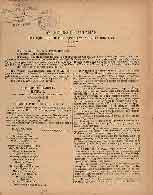
Stenographic minutes of the National Assembly which met in Corfu on August 28, 1916
Cities where Assemblies met were Belgrade, Kragujevac and Nis. Common-law Assemblies, except for several held during the Uprisings, met in Belgrade and Kragujevac. During the First World War, the Serbian National Assembly also met in Corfu.
Buildings where Assembly sittings were held: Belgrade - "The Great Beer Hall" (where the St. Andrew's Day Assembly met), the National Theatre, Captain Misa's Building (the Great School), and the temporary building of the National Assembly near the present-day Odeon Cinema (from 1882); Kragujevac - the National Assembly Building erected by order of Prince Milos in 1859; Nis - Saint Sava Elementary School near the Cathedral, and the building of the Officers' Club.
Stenographic minutes were taken for all assemblies, beginning with the St. Andrew's Day Assembly. Several tens of thousands of pages remain, reflecting not only the parliamentary, but also the general history of the period.
The first Assembly to be reported in a Serbian newspaper (the "Novine Serbske") was the Great National Assembly in Kragujevac, held from February 1 to February 5, 1834.
The first Chairman of the National Assembly (the St. Andrew's Day Assembly) was Major Misa Anastasijevic, its Deputy Chairman was Stefan-Stevca Mihajlovic, and its secretaries were Jevrem Grujic, Jovan Ilic and Milovan Jankovic.
Deputies elected the most times were: Andra Nikolic (nine times) and Zivko Karabiberovic (eight times).
Political parties, the Liberal, Progressive and Popular Radical Party, officially formed in the 1880s, gained the opportunity to become real participants in the struggle for power thanks to the 1888 Constitution. The most successful were the radicals, the creators of this Constitution.
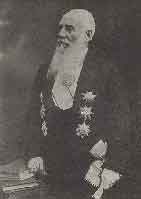
Nikola Pasic, five times Chairman of the National Assembly
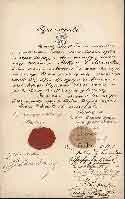
Deputy's Authorisation which belonged to Nikola Pasic
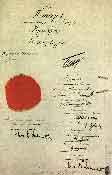
The Act on Belgrade University, 1905
By adopting the 1903 Constitution (in effect just a slightly altered 1888 Constitution), Serbia became a modern parliamentary state. The Constitution was passed without the monarch's participation and is considered one of the most liberal of contemporary European constitutions.
One of the most important innovations introduced by the 1903 Constitution was that the model of royal superiority over the Assembly was abandoned.
According to the 1903 Constitution, votes belonging to a list of candidates which did not win a single mandate were awarded to the list of candidates with the greatest number of votes.
During the Serbian-Turkish War from 1876 to 1878, the Balkan Wars from 1912 to 1913 and the First World War until the withdrawal across Albania in October 1915, the Assembly was in permanent session. It passed several Acts on wartime loans, among others.
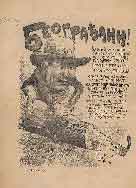
Electoral poster, 1905
In late 1914 and early 1915 the Assembly was rocked by the so-called "opanak-makers' affair" , concerned with abuses committed when opanci were commissioned for the army.
When Nis was being evacuated in October 1915, the entire Assembly archives were destroyed by order of the Assembly's Presidency, so as not to fall into the hands of the enemy.
The Serbian National Assembly passed hundreds of laws, a large number of trade and other agreements with foreign countries, several declarations and other acts.
With the Act of Unification, on December 1, 1918, and the creation of the Kingdom of Serbs, Croats and Slovenes, the legislative function of all popular representative bodies in the unified state ceased. The Serbian National Assembly met for the last time on December 14, 1918. On the basis of a communication from the Royal Government, it elected 84 Deputies from its ranks to the Interim Popular Representative Body of the Kingdom of the Serbs, Croats and Slovenes. Serbia was given another 24 places for territories annexed to it in 1913. Deciding that elections for deputies in those areas should take place urgently, the Assembly ended its work, officially transferring its functions to the Interim Popular Representative Body. Deputies from Serbia made a lasting mark in the work of the National Assembly of the Kingdom of Yugoslavia.
-
9.15 - the National Assembly Speaker receives the Japanese Ambassador to Serbia in a farewell visit (National Assembly House, 13 Nikola Pasic Square)
-
exhibition “Jasenovac - a lasting warning” (National Assembly House, 13 Nikola Pasic Square, Central Hall)


